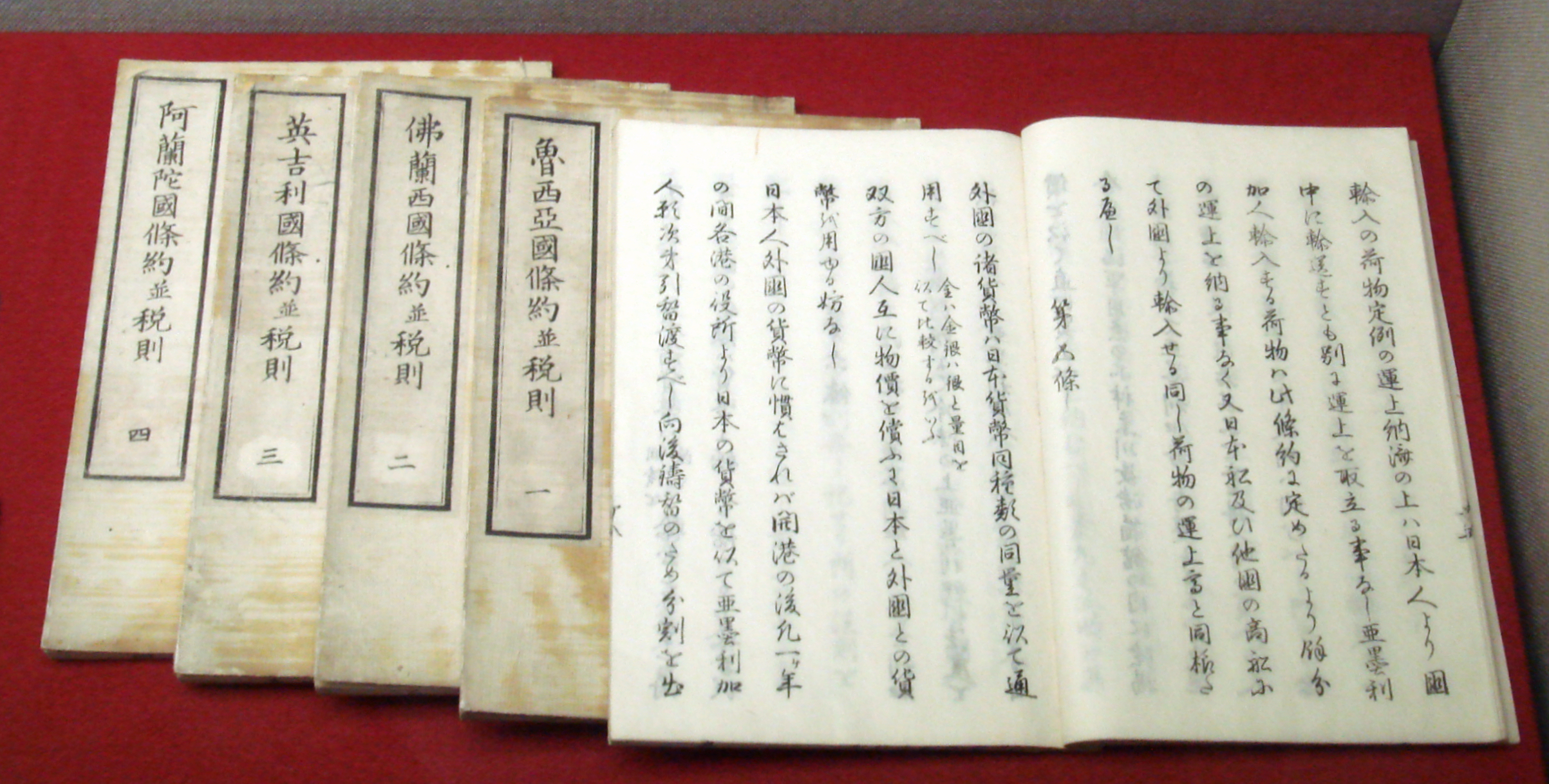Ansei Treaties on:
[Wikipedia]
[Google]
[Amazon]


 The Ansei Treaties (Japanese:安政条約) or the Ansei Five-Power Treaties (Japanese:安政五カ国条約) are a series of treaties signed in 1858, during the Japanese
The Ansei Treaties (Japanese:安政条約) or the Ansei Five-Power Treaties (Japanese:安政五カ国条約) are a series of treaties signed in 1858, during the Japanese
''Negotiating with Imperialism: The Unequal Treaties and the Culture of Japanese Diplomacy.''
Cambridge:
OCLC 56493769


Ansei
was a after ''Kaei'' and before ''Man'en''. This period spanned the years from November 1854 through March 1860. The reigning emperor was .
Change of era
* November 27, 1854 (): The new era name of ''Ansei'' (meaning "tranquil government") ...
era, between Japan on the one side, and the United States, Great Britain, Russia, Netherlands and France on the other.Auslin, p.1 The first treaty, also called the Harris Treaty
Harris may refer to:
Places Canada
* Harris, Ontario
* Northland Pyrite Mine (also known as Harris Mine)
* Harris, Saskatchewan
* Rural Municipality of Harris No. 316, Saskatchewan
Scotland
* Harris, Outer Hebrides (sometimes called the Isle ...
, was signed by the United States in July 1858, with France, Russia, Britain and the Netherlands quickly followed within the year: Japan applied to the other nations the conditions granted to the United States under the "most favoured nation" provision.
Content
The most important points of these "unequal treaties
Unequal treaty is the name given by the Chinese to a series of treaties signed during the 19th and early 20th centuries, between China (mostly referring to the Qing dynasty) and various Western powers (specifically the British Empire, France, the ...
" are:
* Exchange of diplomatic agents.
* Edo, Kobe, Nagasaki
is the capital and the largest Cities of Japan, city of Nagasaki Prefecture on the island of Kyushu in Japan.
It became the sole Nanban trade, port used for trade with the Portuguese and Dutch during the 16th through 19th centuries. The Hi ...
, Niigata, and Yokohama
is the second-largest city in Japan by population and the most populous municipality of Japan. It is the capital city and the most populous city in Kanagawa Prefecture, with a 2020 population of 3.8 million. It lies on Tokyo Bay, south of T ...
’s opening to foreign trade as ports.
* Ability of foreign citizens to live and trade at will in those ports (only the opium trade was prohibited).
* A system of extraterritoriality
In international law, extraterritoriality is the state of being exempted from the jurisdiction of local law, usually as the result of diplomatic negotiations.
Historically, this primarily applied to individuals, as jurisdiction was usually cl ...
that provided for the subjugation of foreign residents to the laws of their own consular court Consular courts were law courts established by foreign powers in countries where they had extraterritorial rights. They were presided over by consular officers.
Extraterritoriality
Western powers when establishing diplomatic relations with coun ...
s instead of the Japanese legal system.
* Fixed low import-export duties, subject to international control, thus preventing the Japanese government from asserting control over foreign trade and protection of national industries (the rate would go as low as 5% in the 1860s.)
Components
The five treaties known collectively as the Ansei Treaties were: * The Treaty of Amity and Commerce between the United States and Japan ''(Harris Treaty)'' on July 29, 1858. * The on August 18, 1858. * The on August 19, 1858. * The Anglo-Japanese Treaty of Amity and Commerce on August 26, 1858. * TheTreaty of Amity and Commerce between France and Japan
The Treaty of Amity and Commerce between France and Japan (Japanese: 日仏修好通商条約) (1858) opened diplomatic relations and trade between the two counties.
Description
The treaty was signed in Edo on October 9, 1858, by Jean-Baptiste ...
on October 9, 1858.
See also
*List of treaties
This list of treaties contains known agreements, pacts, peaces, and major contracts between states, armies, governments, and tribal groups.
Before 1200 CE
1200–1299
1300–1399
1400–1499
1500–1599
1600–1699
1700–1799
...
Notes
References
* Auslin, Michael R. (2004)''Negotiating with Imperialism: The Unequal Treaties and the Culture of Japanese Diplomacy.''
Cambridge:
Harvard University Press
Harvard University Press (HUP) is a publishing house established on January 13, 1913, as a division of Harvard University, and focused on academic publishing. It is a member of the Association of American University Presses. After the retir ...
. OCLC 56493769
Further reading
* Omoto Keiko, Marcouin Francis (1990) Quand le Japon s'ouvrit au monde (French) Gallimard, Paris, * Polak, Christian. (2001). ''Soie et lumières: L'âge d'or des échanges franco-japonais (des origines aux années 1950).'' Tokyo: ''Chambre de Commerce et d'Industrie Française du Japon,''Hachette Hachette may refer to:
* Hachette (surname)
* Hachette (publisher), a French publisher, the imprint of Lagardère Publishing
** Hachette Book Group, the American subsidiary
** Hachette Distribution Services, the distribution arm
See also
* Hachett ...
Fujin Gahōsha (アシェット婦人画報社).
* __________. (2002). 絹と光: 知られざる日仏交流100年の歴史 (江戶時代-1950年代) ''Kinu to hikariō: shirarezaru Nichi-Futsu kōryū 100-nen no rekishi (Edo jidai-1950-nendai).'' Tokyo: Ashetto Fujin Gahōsha, 2002. ; {{OCLC, 50875162
See also
* France-Japan relations (19th century) 1858 in Japan 1858 treaties Bakumatsu Treaties of the Tokugawa shogunate Treaties of the United States Treaties of the United Kingdom (1801–1922) Treaties of the Russian Empire Treaties of the Second French Empire Treaties of the Netherlands 1850s in the Russian Empire